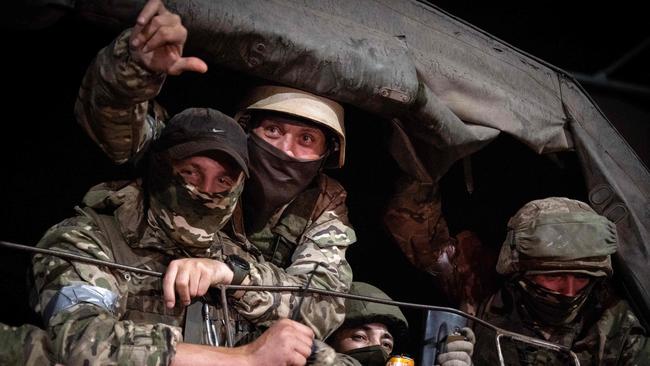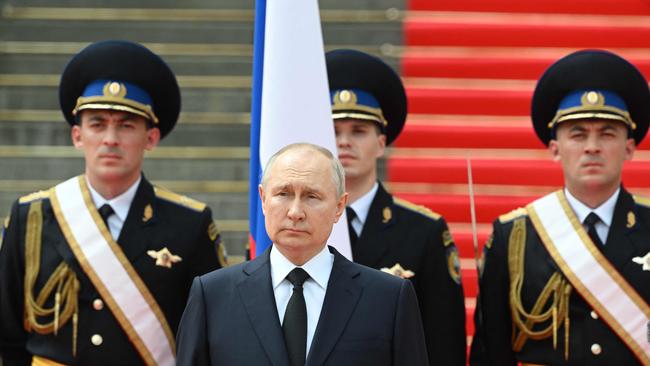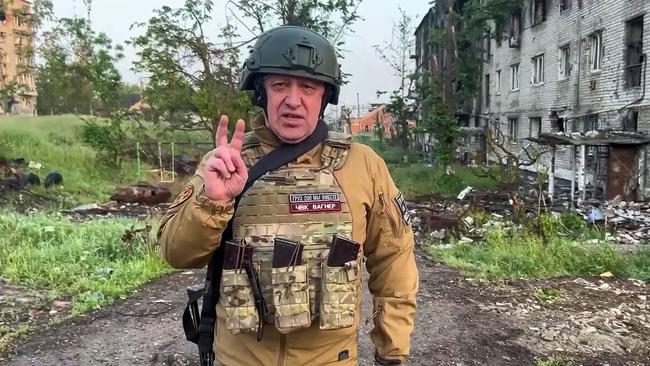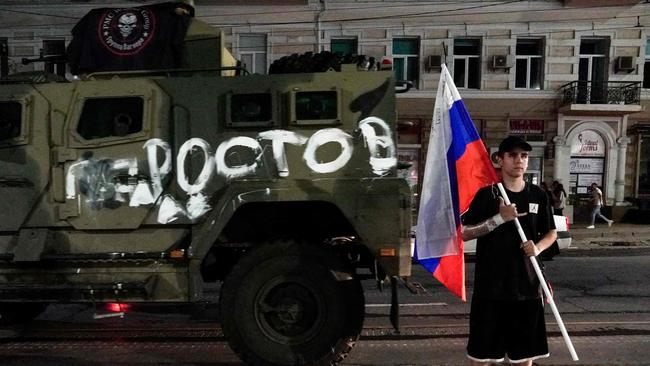How Russia got hooked on mercenary forces
While Yevgeny Prigozhin’s mutinous Wagner Group is the most prominent, it is just one of 37 private military companies currently contracted by Russia. And Vladimir Putin’s reliance on mercenaries shows no sign of slowing.

It is a tall order: Russia needs a professional army seven-million strong, in addition to its conscripted force, to end its reliance on mercenaries, a senior Russian politician has said after the abortive uprising by the Wagner group.
“The country does not need any PMCs [private military companies] and their like,” Leonid Slutsky wrote on the Telegram messaging app. Molfar, an open-source intelligence group focused on Russia, puts the number of mercenaries operating in Ukraine at about 52,000.
Slutsky’s intervention underlines how dependent the Kremlin has become on a mushrooming number of PMCs to fight its battles and extend its influence overseas.
His demand appeared to go further than the defence ministry’s plan to bring mercenary groups under its direct control, suggesting they had no place in the army at all. “There are problems in the regular army, but PMCs cannot solve them,” he said.

A move by Sergei Shoigu, the defence minister, to absorb the mercenaries was seen as an attempt to rein in the Wagner boss, Yevgeny Prigozhin, and his increasingly strident criticism of the war effort.
Instead, it became the trigger for Prigozhin to launch his attempted uprising, demanding the removal of Shoigu and the army chief, Valery Gerasimov, as he marched on Moscow. With Prigozhin exiled to Belarus, questions remain over what will happen to the mercenary force that he built.
President Vladimir Putin may have woken up to the danger of using a private army in a conventional war on Russia’s own doorstep but the utility of Wagner and other such groups to press Russian interests further afield make it unlikely they will be entirely dismantled.

Sergei Lavrov, Russia’s veteran foreign minister, made a pointed appearance on Moscow’s foreign broadcast service, RT, to reassure African allies that Wagner’s operations on the continent would not be affected. Lavrov singled out Wagner operations in the Central African Republic and Mali, where the group offers its services to prop up anti-western governments in exchange for access to natural resources, saying: “This work, of course, will continue.”
Africa has provided a vast growth area for Russian mercenary groups, which operate with state backing and military supplies in areas where Moscow does not want an official footprint.
It was in Ukraine that Wagner – and, subsequently, other PMCs – truly took off, as a means for Moscow to disguise its involvement in a slow-burning separatist war. They earned battlefield experience before expanding to Syria in support of the Russian intervention on the side of President Assad, and then to Libya during its post-Gaddafi free-for-all.
It was Wagner’s hitmen who were drafted in for a mission to “decapitate” the Ukrainian regime by assassinating President Zelensky. They failed and when the regular Russian military’s Kyiv offensive also flopped, Moscow embraced an explosion of new independent and semi-independent military units tied to oligarchs, corporations and competing branches of Russia’s intelligence and military services.
Molfar counted no fewer than 37 PMCs, 25 of them operating in Ukraine. One of the groups, Patriot, is owned by Shoigu himself, in an illustration of how important and lucrative it has become for Kremlin-linked oligarchs to build their own private armies and effectively lease them back to the state.
Even Gazprom, the Russian energy giant, established at least two PMCs, Stream and Torch, in February, after the Kremlin eased the rules, ostensibly to allow energy companies to provide security for overseas assets. Instead, it has enabled such companies to demonstrate fealty while managing the threat of workforce conscription.

Even before Prigozhin’s attempted uprising, PMCs were technically illegal in Russia, leaving the Kremlin room for manoeuvre against them if needed. Putin himself seemed to have tolerated Prigozhin’s increasingly bitter and unhinged rants against Moscow because they were aimed at the military brass rather than him, and it suited him to keep them as rivals. Kremlin observers have long noted Putin’s fondness for watching other power centres battle one another for influence.
Daniel Triesman, a professor of political science at the University of California, Los Angeles, wrote of the “tripwires” Putin’s system had developed to prevent a coup, noting that those “with armed men at their command lack the mutual trust to organise a conspiracy”.
As it transpired, Wagner was big enough and motivated enough to go it alone, if not to follow through with an attack on Moscow. As of Monday the group was under orders to turn over state-supplied heavy weapons, including those used against Russians on Russian soil. Wagner fighters will be allowed to join Prigozhin in exile, return home or join the regular Russian military.
The future of Russia’s private armies, however, is still unclear.
THE TIMES




To join the conversation, please log in. Don't have an account? Register
Join the conversation, you are commenting as Logout